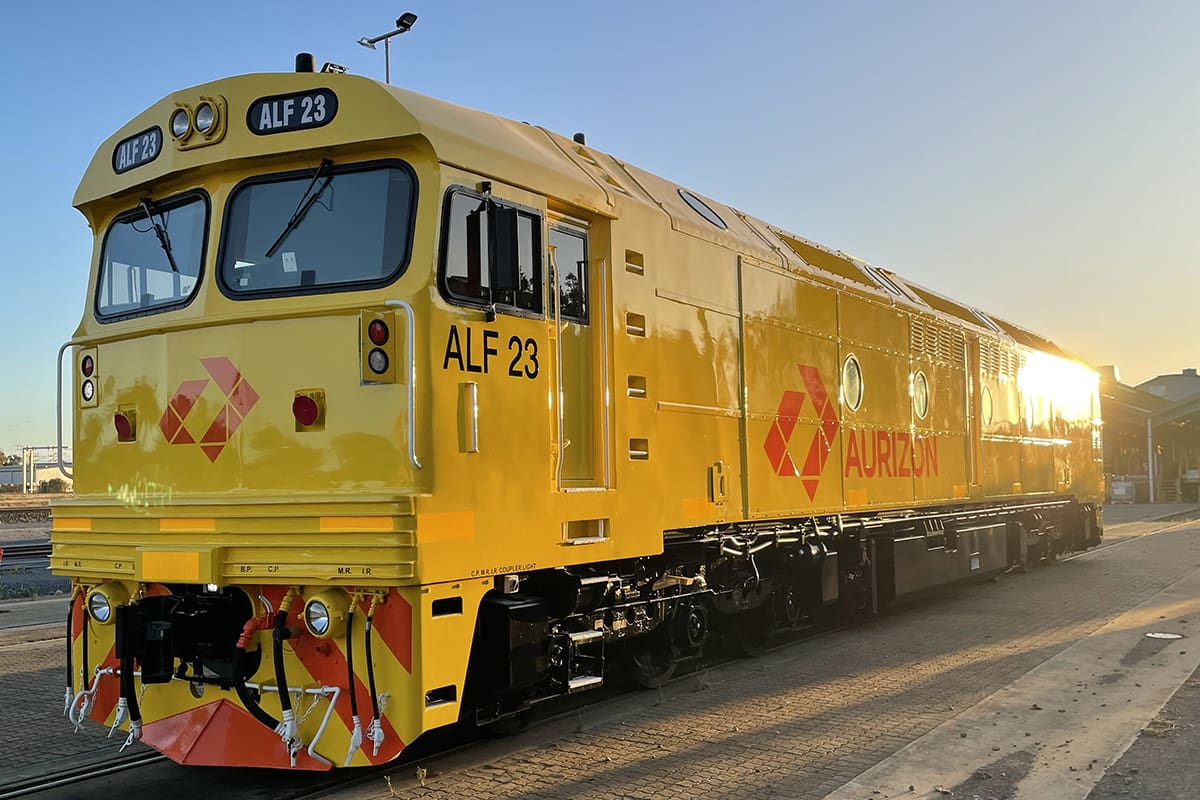
Aurizon’s Bulk operations launched overhauled locomotives in South Australia in December last year. Photo: Aurizon
RAIL operator Aurizon has blamed prolonged wet weather across Queensland and New South Wales for a 34pc drop in net profit after tax in the half year ending December 31 as compared with the 1H22 result.
In results released on Monday, the company’s Earnings Before Interest, Tax, Depreciation and Amortisation at $673M were down 7pc from $727M in the previous corresponding period, while NPAT at $169M was down from $257M.
Results for Aurizon’s Bulk business was a bright note for the company, with EBITDA up 33pc to $100M and revenue increased 51pc to $521M.
Bulk operations include the handling and delivery of commodities including: grain; fertiliser; livestock; iron ore; cement, bauxite; alumina, and base metals.
One Rail Australia, which runs in South Australia and the Northern Territory, has been rebranded under Aurizon ownership as Bulk Central which, along with a long-term contract with Western Australia’s CBH Group, form the two major operations in the Bulk business.
Aurizon CEO and managing director Andrew Harding said Aurizon was now the largest rail hauler of grain in Australia, with operations in WA, SA, Queensland and NSW.
“We are pretty excited by that market,” Mr Harding told shareholders.
“We delivered 12.5Mt last calendar year, which is a record on rail.”

Aurizon CEO and managing director Andrew Harding.
In addition to hauling for CBH, Aurizon also has contracts with Viterra in SA, through the One Rail purchase, and CHS Broadbent, Cargill, Thallon Grain and GrainCorp in NSW and Queensland.
Aurizon CFO and Group Executive Strategy George Lippiatt said in the HY23 period, grain contributed around 15pc to the Bulk business’ revenue.
He said most of this came from the SA and WA operations, which was unusual for Aurizon.
“Where we tend to get a better [earnings before interest and tax] contribution because we have a lower capital base in grain is in the east coast,” Mr Lippiatt said.
“Unfortunately, that’s where we saw weather disruptions in the half.”
Bulk projects in works
Mr Harding said Aurizon was almost halfway through a series of capital-expenditure projects aimed at improving Bulk operations.
Costing a total of $430M, the largest project is the purchase of $320M work of standard-gauge rolling stock to support grain, mineral sands, copper and containerized freight.
The company is also planning $20M in track upgrades on the SA line under a 10-year contract extension with Gypsum Resources Australia.
The remaining $90M will go towards purchasing port real estate at Newcastle, and port equipment.
Future developments flagged
Aurizon also signaled the probability that more upgrades and projects were likely in coming financial years.
“Our Bulk team have over 200 potential opportunities in the pipeline worth more than an estimated $1.5B in annual revenue,” Mr Harding said.
“These opportunities are across all regions where Aurizon operates and commodities.”
Mr Harding said not all of these opportunities will progress, and the Aurizon team was currently working through which ones will bring the most benefits to the company and its customers.
Focus on SA, WA
Mr Harding said Aurizon was currently concentrating on increasing capacity and making improvements to its operations in SA and WA.
“We have got back into grain in a heavy way, and…we have focused on the most resilient regions and our ability to scale up in a cost-effective way.
“We like WA and we like South Australia.”
He said the 2022-23 record winter harvests in both states have put pressure on the rail network to perform.
This is Aurizon’s first season in SA, and Mr Harding said there has been “strong demand” for rail services, led by Viterra.
“We have been asked to try and find another consist to put in down to haul grain and we are busily trying to find that…because there are high volumes across the nation.”
A consist is a group of rail carriages with or without a locomotive.
He said in WA, it was a matter of innovating to try and get the ever-growing grain volumes to port.
“We are working in Western Australia on how we can get longer trains, how can we get them loaded quicker and how can we get them unloaded quicker.
“Both volume and yield improvements are expected once that infrastructure improves.”
NSW on cards
Mr Harding flagged a possible “scale-up” of grain operations in NSW.
Currently most of Aurizon’s NSW operations involve hauling coal on the Hunter Valley line to the Port of Newcastle.
“We have been working with [group executive coal Edward McKeiver] and his team on how we can get synergies there (and) also converting coal wagons into grain wagons, which has had safety and payload improvements.”
More grain on rail
Mr Harding said across the board, there was a greater push to get more grain on rail and to reduce the grain industry’s reliance on trucks.
“Strategically we like the momentum that is starting to come through in the grain market.
“For many years there hasn’t been a lot of or modest investment into improving the grains supply chain, particularly infrastructure.
“There is a lot of momentum from governments, from exporters and from traders into driving improved performance and lower costs for the grains supply chain overall.
“The best example of that is the $400M investment in the Western Australian supply chain.”
Grain Central: Get our free news straight to your inbox – Click here

HAVE YOUR SAY